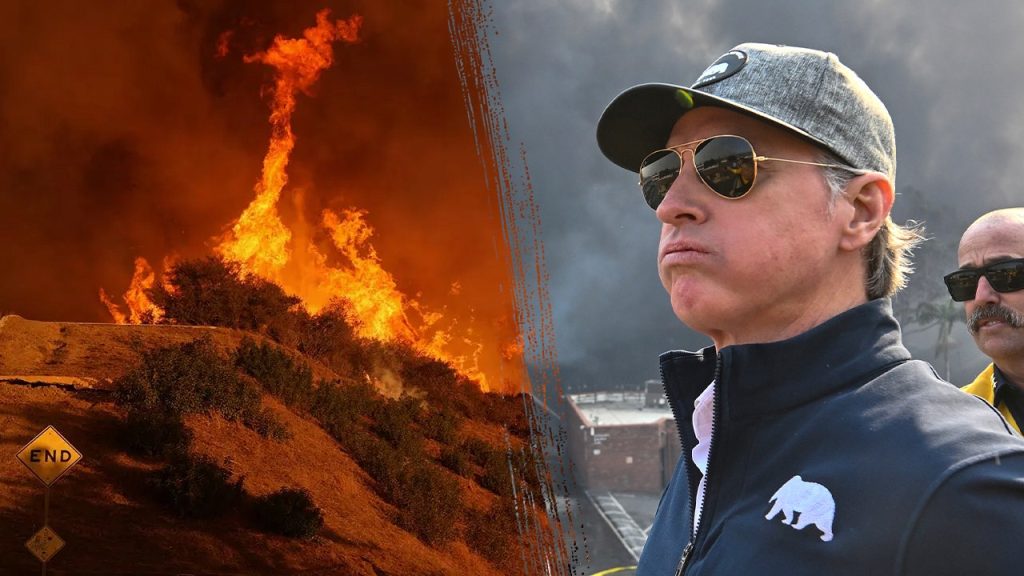The devastating wildfires that have ravaged California in recent years have ignited a fiery debate over the state’s preparedness and response strategies, with Assembly Minority Leader James Gallagher leading the charge against what he deems a deficient approach by state leadership. Gallagher draws parallels between past infernos, such as the 2019 Paradise fire that decimated his district, and more recent blazes, highlighting the recurring failure to address the root causes of these catastrophic events. He criticizes the state’s handling of crucial infrastructure, citing instances of fire hydrants running dry amidst raging flames, and lambasts Governor Gavin Newsom for what he views as performative investigations rather than decisive action. He contrasts Newsom’s approach unfavorably with Florida Governor Ron DeSantis’s hurricane response, arguing for stronger leadership in times of crisis.
Gallagher’s critique extends beyond immediate disaster response to encompass long-term preventative measures, particularly concerning forest management. He points to the accumulation of dead and dying timber and underbrush on federal lands as a significant contributing factor to the severity of these fires, advocating for increased efforts in clearing and maintaining these areas to mitigate future risks. He also emphasizes the need for improved infrastructure and laments what he sees as a diversion of resources from essential public services to “liberal pipe dreams,” insisting that the state government should prioritize its core responsibilities of public safety and infrastructure maintenance. Gallagher recalls advocating for a $1 billion funding allocation in 2021 for wildfire prevention and combatting issues within the state’s insurance market, expressing concern over subsequent reductions in appropriations.
The Governor’s office, however, vehemently refutes these allegations, asserting that under Newsom’s leadership, CalFIRE’s budget has nearly doubled since 2019, reaching $3.8 billion. They maintain that water reservoirs in Southern California are at record levels, dismissing claims of water shortages as misinformation. Newsom himself has taken to social media, emphasizing the state’s commitment to firefighting resources, including a significant expansion of the firefighting workforce and the development of the world’s largest aerial firefighting fleet. He also underscores a tenfold increase in forest management efforts since taking office.
The dispute over wildfire funding and response extends to legislative battles. Republican Senator Brian Dahle accuses Newsom of neglecting fire victims by vetoing a bill designed to protect them from income taxes on settlement payments received for fire-related losses. Newsom counters that he supports the bill’s intent but believes such measures should be addressed through the annual budget process, citing previous legislation he signed providing similar tax exclusions for past wildfire settlements. This disagreement highlights the ongoing tension between the executive and legislative branches on how best to allocate resources and address the needs of wildfire-affected communities.
Further fueling the political firestorm is Newsom’s decision to call a special session to address wildfire relief alongside a proposal to “Trump-proof” the state in anticipation of a potential Trump presidency. This move has drawn sharp criticism from Republican lawmakers, who accuse Newsom of politicizing disaster relief and exploiting the situation for partisan gain. Assemblymember Greg Wallis and Senate Minority Leader Brian Jones both condemned the linkage of fire relief funds to the “Trump-proofing” initiative, urging a focus on assisting victims without political maneuvering. They argue that the proposed $50 million allocation for legal action against the former president would be better spent on helping fire-ravaged communities recover and rebuild.
The cancellation of the special session due to the escalating wildfire threat further underscores the urgency of the situation and the need for a unified, non-partisan approach to addressing the crisis. The ongoing debate reveals deep divisions within California’s political landscape, with accusations of mismanagement, misallocation of funds, and political opportunism flying from both sides of the aisle. As the state continues to grapple with the devastating impacts of these recurring wildfires, the need for effective leadership, bipartisan cooperation, and long-term solutions becomes increasingly critical. The conflicting narratives surrounding funding, prevention strategies, and disaster response highlight the complexities of this ongoing challenge and the urgent need for a concerted effort to protect California’s communities from future infernos.

